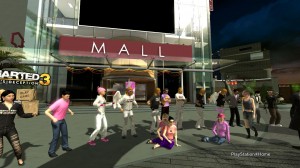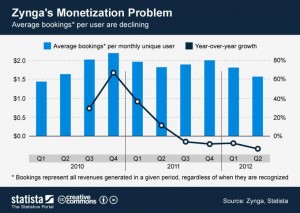How Important Is “Community” to Home?
by NorseGamer, HSM Editor-in-Chief
Think of the actual community you live in.
Chances are, if you’re living in typical urban or suburban Americana, you’re surrounded by a typical community environment: residential neighborhoods surrounding a commercial downtown and industrial sectors. Except that if you look more closely, the “community” is really a conglomeration of smaller communities, all catering to a wild array of interests: sports, theatre, politics, and so forth. And within each of those categories, you have further sub-groupings: a community of tennis players, a community of water polo enthusiasts, a community of golfers, et cetera.
Sure, we may all live in the same town, and pass each other in coffee shops and restaurants, but your “community” as such is a much more de-centralized environment than perhaps you realize.
PlayStation Home is the same way. And this is perhaps an interesting realization for us to make, as gamers. When we play video games, everyone is sharing exactly the same experience. We then seek out internet resources, such as message boards, and communicate with others of like mind. It’s a group of disparate people brought together by one common passion.
Home, however, isn’t like that any more. In its early days it was; it had so little to offer, and the relative user base was so small, that the people who stuck around with Home stayed because they enjoyed the experience of Home itself, not any of the attractions therein. And when something truly big came to Home — first Xi, then SodiumOne, then Novus Prime — because there wasn’t really anything else at the same level coming out near the same time, it was the one major attraction for the community to focus upon.
 Sony’s business strategy with Home is an interesting one: rather than invest in deepening the social experience of Home itself, they decided to reinvent it as a gaming platform. Though I disagree with the sum of money that was spent introducing the Hub to Home — because it doesn’t clearly monetize, it has design flaws which have been covered elsewhere in HSM’s pages, and simply reskinning Home did little to fundamentally deepen the Home experience — it did establish Home firmly as a gaming platform. And if you look at 2012, which we accurately predicted would be remembered as the “year of the game” for Home, it’s clear to see that the concept of one core community for Home really doesn’t exist any more.
Sony’s business strategy with Home is an interesting one: rather than invest in deepening the social experience of Home itself, they decided to reinvent it as a gaming platform. Though I disagree with the sum of money that was spent introducing the Hub to Home — because it doesn’t clearly monetize, it has design flaws which have been covered elsewhere in HSM’s pages, and simply reskinning Home did little to fundamentally deepen the Home experience — it did establish Home firmly as a gaming platform. And if you look at 2012, which we accurately predicted would be remembered as the “year of the game” for Home, it’s clear to see that the concept of one core community for Home really doesn’t exist any more.
Think about it. Never in the history of Home has so much major content been released in such rapid succession. You now have micro-communities that have grown up throughout Home: people who cluster around specific games, who now define Home more by that gaming experience — and the people they share it with — than any sort of central shared experience.
This isn’t exactly a new trend with Home. If you think back to the old EA poker rooms, that community — which grew up around a specific game — defined Home as a place to go socialize with fellow poker pals. And when the poker rooms were removed, some of those people left Home, never to return. Certainly, if you visit Digital Leisure’s poker rooms, you will find the same close-knit group that generally indulges in little other than that one activity which they enjoy.
 Such behavior has been present in Home for years. I recall editing an article back in 2010 that dealt with a bunch of these “fams” wrangling amongst themselves to come up with a kind of ruling council in order to try to establish some sort of “official” voice to SCEA. To any outside observer, this concept is obviously ridiculous; yet to the people involved, it was their sole focus for using Home, and they took it very seriously.
Such behavior has been present in Home for years. I recall editing an article back in 2010 that dealt with a bunch of these “fams” wrangling amongst themselves to come up with a kind of ruling council in order to try to establish some sort of “official” voice to SCEA. To any outside observer, this concept is obviously ridiculous; yet to the people involved, it was their sole focus for using Home, and they took it very seriously.
So now, today, we have Home’s vision as a game platform well and truly realized; one can indulge in No Man’s Land, Cutthroats, Mercia, MiniBots or any number of other games both past and future (Home Tycoon, FUBAR, Uproar, etc.) — and discover surprisingly little overlap in the people involved.
Home, then, is more like an actual community than a traditional game community; it is a decentralized series of discrete experiences clustered around a central commercial gathering point.
Is this a good thing?
The reason why this is worth asking is because of the concerns that Home, as a metaverse with no purpose, has no “soul” — that the “community feeling” of Home is gone. Generally, this sentiment is put forth by Home users who have been around since the early days (those who are left, in any event): that Home has not lived up to its potential because it focused on being a decentralized gaming platform rather than offering centralizing experiences to bring people together (most notably Xi).
And this ties into another question: how many major game releases can Home support at any given time? Since Home is not a unified, cohesive environment — it’s a hodgepodge of competing interests — you now have a lot of developers with high-cost IPs competing for a finite number of consumers at the same time. So if Sony’s efforts with Home are centered on promotional announcements and marketing blog posts, rather than in-world community growth, then ultimately it must be asked: how important is “community” to the health and fiscal growth of Home?
Does it even matter?
 It is at this juncture largely pointless to ask Sony itself to commit resources to deepening the social aspects of Home, beyond the (very welcome) core updates and perhaps some periodic interface changes. With the next console generation on the horizon, a new handheld device — the Vita — to support, and a shift in emphasis with the Digital Platforms initiative, there’s far more on Sony’s radar than just Home. Thus, it really is a question of how valuable community-building efforts are by Home’s third-party developers who rely on the Home platform for all or a portion of their revenue, even while they develop projects such as Vita games which have little to nothing to do with Home.
It is at this juncture largely pointless to ask Sony itself to commit resources to deepening the social aspects of Home, beyond the (very welcome) core updates and perhaps some periodic interface changes. With the next console generation on the horizon, a new handheld device — the Vita — to support, and a shift in emphasis with the Digital Platforms initiative, there’s far more on Sony’s radar than just Home. Thus, it really is a question of how valuable community-building efforts are by Home’s third-party developers who rely on the Home platform for all or a portion of their revenue, even while they develop projects such as Vita games which have little to nothing to do with Home.
I will argue that community building does matter, but for one very specific reason: it can’t hurt.
Human nature is to want to get other people enthusiastic and involved in the things we personally feel passionate about. This validates the time, money and emotion we invest into something. And what better way to encourage such behavior than by officially sanctioning and encouraging it?
 Social freemium games generally have very low monetization percentages; it is not at all outrageous to expect that only single-digit percentages of Home users actually convert into revenue with any particular attraction. Within this group, you have your so-called “whales,” who are responsible for the sharp end of the power-law distribution curve. Formal community outreach, then, helps to sustain that user engagement and provide a resource for user evangelization.
Social freemium games generally have very low monetization percentages; it is not at all outrageous to expect that only single-digit percentages of Home users actually convert into revenue with any particular attraction. Within this group, you have your so-called “whales,” who are responsible for the sharp end of the power-law distribution curve. Formal community outreach, then, helps to sustain that user engagement and provide a resource for user evangelization.
Right now, more than ever, it is extremely important for developers to have formal community-building initiatives. Home has never been such a competitive marketplace, offering so many differing high-cost attractions with so much riding on them. The more you keep a consumer’s consciousness and engagement on your product, the less likely they are to explore — or spend money on — a competitor’s offerings. Hence why some of Home’s most prominent developers have built their own public showcases, in order to try to bypass the navigator’s commerce setup which shows everyone at once, and are experimenting with other means of asymmetric marketing to bring their own message directly to the consumer — in some cases without relying on the infrastructure of Home to do so.
This is particularly important because these developers are not necessarily synonymous with Home. And were I one of these development houses, I’d be focused real hard right now on how to migrate the audience I’d built up within Home into ventures that might show up outside of Home, such as on the Vita — or elsewhere. In this regard, brand awareness and consumer propensity to monetize are quite important; the ability to move a consumer to spend money on a developer’s product — even if it has nothing to do with Home — should be a major business objective for Home’s third-party developers at this point. Certainly, the first steps Sony Digital Platforms has taken towards re-integrating Home’s core userbase into the larger PlayStation pantheon are already plainly visible, and such cues should not be ignored.
The jury’s out on whether or not 2012 is a “peak oil” year for Home; that said, we may have already passed the peak of Sony’s direct development of Home, beyond platform sustention and infrastructural updates. And it is now — right now — that Home faces its greatest challenge: can it, in fact, survive as a decentralized game platform? There’s no such thing as a “central” Home experience any more. If Home’s original core user base was drawn to it because of its concept as a social network for gamers, and Home’s transformation has risked alienating them in pursuit of larger audience numbers as a gaming platform whose growth is sustained by third-party developers, then at some point there has to be an accounting of whether or not this experiment worked.
Why is this so important? Because no one’s ever tried a console-based social MMO metaverse before. There’s no template for something like Home. And you can damn well bet that Microsoft and Nintendo both have kept an eye on Home, to see what works and what doesn’t. They’ve had the benefit of studying a rather complex venture without having to invest in it. And the legacy of Home will leave a ripple effect that will affect business decisions by all three major console providers well into the next generation, as well as the smaller third-party developers that choose where to invest their resources.
We see now that Home’s “beta” tag is, perhaps, all too apropos; it is a beta, a testing ground, to hone a business formula that will be employed — by Sony and/or someone else — in the years to come with the next generation. One element, however, in this new freemium gaming age where behavioral economics are so much more carefully scrutinized, is clear: that community building, in order to better achieve revenue targets, is clearly important.
It is from such formal community building that users create their own communities and groups, form friendships, and create memories that last far after the source is gone. Which, ultimately, is what this is all about.




 LinkedIn
LinkedIn Twitter
Twitter
It’s a double edged sword though, isn’t it? On one hand you need people to get into a trend or game to make back the money invested, and of course, generate more money for the next installment. On the other hand, you cant do that without a decent kind of following (or community) behind said endeavor. Delicate balance indeed. Poke that jenga tower with the Stick of Competition and we can see why the Home businesses do what they do.
However, humans are social creatures by nature, and need little to no provocation to form groups and social circles. I dare say if you stripped Home down to nothing but bare white rooms leaving nothing more than interaction with each other there would still be regular users coming in each day. There’d be a MASSIVE exodus sure, but like me, there are people who use Home first and foremost as a way of ‘getting out’ and meeting new people. All the bells and whistles are just pleasant distractions to folks like me I’d say, but then, I’ve been into Home since the start and have cone from having nothing more than a purely social experience with it, and watched it turn into the bikini-fest it is today.
I agree KrazyFace. We are social creatures and we need to have that in Home or it wouldn’t last six months. There are many varied interests in Home, many represented by clubs or other social groups, some gaming related some not. Decorators clubs, the Grey Gamers, the fashionistas,the glitchers, the Homelings are all things done outside the gaming part. These are totally social, and I believe they would exist outside the games in Home.
If you put a bunch of gamers in a room for awhile with nothing but some string, paper and glue, many would come up with their own games to pass the time. It is the same with the people in Home, they have come up with their own meta-games and done it in a social setting, thereby creating their own little communities. Great article Norse, you bring up some important points that need to be looked at closely by those involved.
How important is community to Sony? This platform offers much more than other platforms that offer a metaverse. Games.
Yes people relate to the games offered because they like playing these games together.
Purpose in Home depends on the community you either sample, or become a part of. I am sure there has been a lot learned from this business model, that will carry on in the next iteration of whatever metaverse is created.
It will have as much soul as the users that frequent give it. If Home lost it’s community, I venture to say it would collapse.
Betting on new users without giving them purpose is a losing hand. Market deeper experiences to those that find Home to be more than a game. A place to call Home.
You will win everytime, and create something people WILL want to break out there wallet for. To have, and share those experiences. Home really is much more than a game, no matter what it is being marketed for. I would have to say, that is it’s strength. So to KrazyFace, I agree!
How that white square box is presented is something Playstation Home has in their hands.
A lot of micro community’s have been born due to them having to, homes not very well set up for social users. Gamers play games is a given but if you wanted to meet users that liked say country music where would you go. If I wanted to meet users that were my age where would I go. Music and age play a key part in most social groups. Look how many hang around areas that have music. But say we had several hubs one for teens 20s 30s over 40s or even better different hubs for music as most people that like a certain type of music fall into similar demographics. That would give home a wider social appeal appeal than its got. But as a previous article said we have become reliant on freebies too much. The mediocre games are going to have a short shelf life either because users have got all the rewards or the hysteria around them has gone. So us as social animals make our own community’s. But that breeds a sort of misuse, ie fams which on home seem to sent up like the mafia but the original fams before home were more like a virtual family. There seems to be a competitive edge on home that perhaps comes from being a gamer. A competitive nature that gets brought out by someone wearing or not wearing a gold suit. Homes there to make us all feel better about ourselves just currently it’s geared towards I feel better than you, so we as users either embrace that. Or do our own thing.
I see what you’re saying Gary, that there’s a divide between the have and have-nots but, like most places even in the real world, this will come about anyway. Some choose to just not spend in Home, I was one of those who chose to use Home as a purely social platform. Hell, I even laughed at those who spent money on anything for the first two YEARS of my Home-life! But then I found more time for it in my daily life, and began investing in it to make my time spent there a little better. Now, there’s no stopping me! That’s why I came across to the US; better deals on better items and even (dare I say it) a better community.
I do think that Home’s differing community would greatly benefit from spaces geared towards music themed demographics though, that’s an excellent idea. All we have right now is that rage place that I visited once to erm, yeah, get the free stuff lol.
It makes good business sense to have, the have and have nots. but its not just that its also the people that cause grief to others by various different means to make themselves feel better. You cant go on home without seeing it. most things on home happen in real life but arent as in your face as they are on home, the haves and have nots dont wind each other up in the front of the X7 club in real life. Its whether you go on home to enjoy yourself or to enjoy yourself at the expense of others enjoyment and currently it feels self centered and geared towards enjoyment at the expense of others. which plays to the gamer in us all. but doesnt make the community important.
Great Article Norse, I think community is very important to Home and games in general. Game come and go, and the big thing now, usually isn’t down the road. A community gives a game like Home, an infinite shelf life. I feel with many people they come to Home for the games and stay with the community.
Economics is a very interesting subject and one that you always seem to capitalize on Norse (forgive the pun there. -Just a little sick bean counting humor). There are such “Choice” comments on this article I think that I add to this line of power commentators only as an afterthought.
However, I am what is the most growing demographic in PSH- not that I am “average” (except maybe in math) to any stretch of the imagination… but if we use me as a Marketing Rodent -I could enlighten you all on a few things:
1. I started Home maybe coming up on two years ago now.
2. I had no interest in gaming at all- not what-so-ever.. not in the least- or as our dear friend Krazy would say “not even a wee bit.”
3. I bought my PS3 because of the fact that it had a blue ray and if I ever decided to try a game I could.
4. For a good solid year and a half I never even touched a game on Home except maybe orb runner or some promotional thing… to get free stuff -heh… but only if the prize was something I was interested in (more marketing advice).
5. With the help and encouragement of friends I actually started playing some games in the space- except most of them did not much interest me as I am not into shooting for fun or in racing all the time.
6. After meeting some friends that were mature and into gaming I found myself more and more curious about this little subculture of humanity. Do grown-ups really play games? -“why, yes Mrs. Flintstone they do!”
7. I was so curious that I actually bought Journey and Little Big Planet2 (which is an artist’s dream- and should be what Home is really like). Talking talking and moving mouths and everything… very nice.
8. Why did I buy these two games? Because after surfing around PSH and playing a few social games with friends on PSH that were helping me learn how to do so, I felt confident enough to want to play. I would have never bought them if there had not initially been that social aspect of a centralized platform.
9. Mercia was over the hump for me. When you can go into a game and play it with other people and talk about the events of that game with them that is the next step… but I would ask Marketers who am I going to play Mercia with if I have not already met friends I want to go with? Sure I could meet people there but what if I want to go with other people that I meet and do things with elsewhere? How am I gonna find them?
10. Conclusion- The social part of Home is very VERY important for bringing my demographic in. I am a professional woman and selling me on gaming from the outset is just a ridiculous thought. -More than that I have disposable income to spend on fun. I could go down to the local jazz joint and have a cosmo with the girls instead. But lets say I want to socialize in my fuzzy housecoat instead… wow that is a lot easier.
Glass of wine and chocolates- flannel jammies and tank top- mud mask on my face and I am socializing -gotta love it! BRB I gotta scrub my mask off